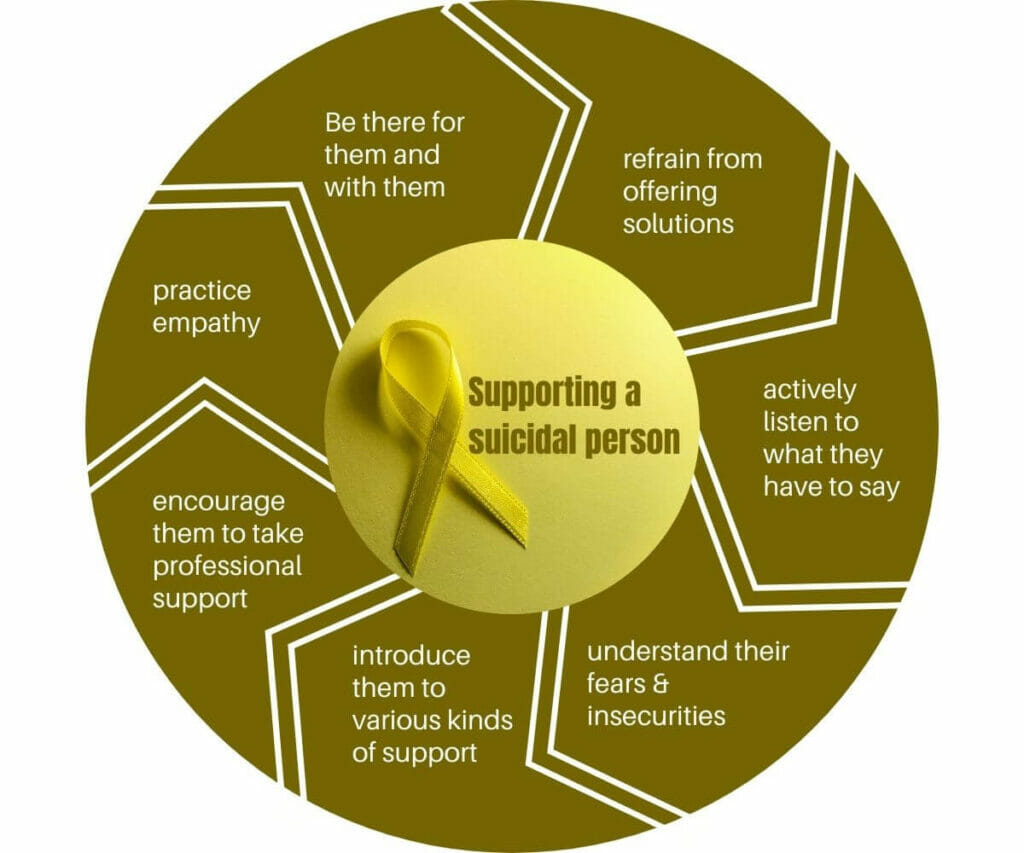I would like to start with the disclaimer that I am not an expert on helping a person with mental health issues or suicidal thoughts. However, I have been that friend who is perceptive of others’ troubles; the one people feel comfortable opening up about their struggles, spilling deep dark secrets, and thoughts about harming themselves/ taking their lives. I have also been the friend who was ill-prepared to deal with the confession once it came and ill-equipped to provide the right support. This article is a compilation of various learnings that came my way as I embarked on my journey to be more aware and empathetic to their struggles; to help someone struggling with suicidal thoughts.
Suicidal thoughts – A taboo
In most societies and cultures, human life is considered sacred. Thoughts and talks about suicide are taboo (of course, in recent times there is a lot more awareness and support in the field of mental health), but for most situations, we react with disbelief/disapproval/ judgement when faced with a revelation.
Empathising with the person and being there are the foremost things one must do to take away suicidal thoughts from a person and help her/him.
Be there
The single most important thing we can do to help a loved one with suicidal thoughts is being present, and being present requires listening actively with empathy. We are not required to provide magical solutions; wipe out all their troubles; chase away their demons; fight the helplessness; disperse advice; rescue them. Just being there with them and acknowledging their fears and thoughts helps.
Empathise
Empathy is at the core of any relationship. It fuels connection, helping us to relate to a person’s struggles and recognise their emotions. It also helps us avoid judgement and shows that we understand. The first step to being empathetic is to practise active listening.
So, what can active listening do? Active listening is person-centred and creates a safe environment to converse, free of judgement and helps others by releasing tension. Besides, active listening clarifies the other person’s thinking, puts things in perspective, shares the burden and alleviates loneliness.
- Also Read: Living With Gratitude Leads You To Happiness
What are the warning signs?
Suicide Ideation is the result of a deep sense of despair and hopelessness. When the person feels helpless (out of control) and is accompanied by feeling worthless/failed; when the psychological pain becomes so unbearable that the person wishes to cease existence and suicide seems like the way out to end it all.
Warning signs – These are some warning signs which may indicate that a loved one is distressed, has suicidal thoughts, and needs support and help
- Directly- Direct plea for help/support.
- Indirectly- It can be told in a joking way or something said in a passing manner.
- Planning- Giving away prized possessions; making a will; getting affairs in order; nominating beneficiary; saying farewell; researching suicide methods.
- Changes- Behaving out of character; change in emotional state; changes in sleeping pattern, appetite, appearance; anxiety; mood swings; behaving too reckless or too much at peace.
The signs could be subtle or in your face; and, you may initiate the topic straightaway by asking if they need help and have any suicidal thoughts. No, it doesn’t give them ideas to consider that as an alternative. But, it opens up the channel to talk and seek help/support.
How do you support and help someone with suicidal thoughts?
Once we have come to terms with the knowledge that a loved one is having suicidal thoughts, it is time to provide support. We may be uncomfortable talking about it and not know what to do, which is completely fine. The important thing is to be present and make an effort to support. Following are some suggestions which can be considered while interacting with a suicidal person.

- Respond with empathy without passing any judgement or trying to negate their feelings.
- Do not paint an optimistic viewpoint. Try to understand their fears and insecurities.
- Find out how long they have been feeling this way and if they’ve made any attempts to end their life.
- If they have previously attempted/ have lost someone to suicide/ are actively considering suicide, stay focussed and try to be with them as much as possible.
- Practice empathetic listening, helping them clear their thoughts by venting out. Refrain from offering solutions and explore what they have tried so far and how it has worked for them.
- Explore if someone else is aware of their distress. If so, these people can be part of your support and care team to provide optimum support effectively.
- Help them discover various forms of support and gently encourage to employ those as and when in need (Journaling, music, hobby, activity, art, and relaxation)
- Explore their options and possible consequences.
- Last but not least, explore their willingness to seek professional help and encourage to seek support (Suicide prevention helpline, Counselling and Therapy) and medical treatment as the case may be.
Caregivers must take care of themselves, too
Practice empathy at all times when helping a suicidal person. However, you are not entirely responsible for their well-being, and they need to have a personal commitment and desire to recover and get well. It is heart-breaking to see our loved ones suffer, and as someone supporting them through it all, one may at times themselves need care and support to deal with their difficult emotions. Self-care is crucial for caregivers, so do prioritise and ask for help in whichever way you deem necessary.
- Also Read: World Mental Health Day – 10th October
Final word
This article is just an attempt to raise awareness about the growing prevalence of suicide and how each one of us has the ability to provide strength and support to the ones in need and collectively heal the world.
Peace, Love and Light!
Image: canva.com

